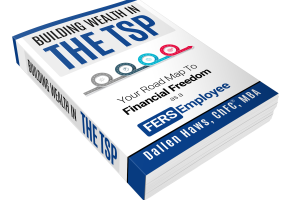How much do you really need in your TSP to have your dream retirement?
Is it 10x your salary like all those finance articles say?
In my experience, that rule does not apply to federal employees.
In this article, I’ll walk you through exactly what you need to do to know if you have enough in your TSP.
Way too Much or Too Little?
I have seen $400,000 be plenty for some and not even close to enough for others.
It simply depends what other income you have and what you want to spend in retirement.
If I was you, this is how I’d figure out if your TSP is big enough.
Note: This article is going to be one big example but of course you’ll want to plug in your own numbers to apply it to your situation.
Let’s Start with Income
We have to know what other income you’ll have outside of your TSP.
Let’s start with your pension.
Let’s say that your gross monthly pension is going to be $2,500/month in retirement.
If you want to know how your pension is calculated then go here.
But there are a number of things that must come out of your pension before you actually are able to spend it.
For this example, let’s assume that you are married and elect survivor benefits, keep your health insurance, some life insurance, and pay your taxes.
Your net Pension might look like this:
Gross Pension: $2,500
Survivor Benefits: -$250
FEHB: -$400
FEGLI: -$35
Taxes: -$300
Net Monthly Pension: $1,515
FERS Supplement
And let’s assume that you are also eligible for a FERS Supplement payment of $1,500.
The only thing that will be deducted from your FERS supplement is taxes so it might look something like this:
Gross FERS Supplement: $1,500
Taxes: -$225
Net FERS Supplement: $1,275
Total Fixed Income
So with a net Pension of $1,515 and a net FERS Supplement of $1,275 your total fixed income is $2,790.
That means that before you take any money out of the TSP you will already have $2,790 in your bank account every month to spend.
How Much Your TSP Can Provide
The 4% rule is a great way to estimate how much income your TSP can provide for you for the rest of your life in retirement.
If you want a full article about the 4% rule then go here.
In a nutshell, to estimate how much income your TSP can provide for you every year all you have to do is multiply your TSP balance by 4%.
$400,000 x 4% = $16,000
And if we want to change that to a monthly number we divide it by 12.
$16,000 / 12 = $1,333
But do you get to keep the entire $1,333? If you took the money from the Roth TSP then yes but most federal employees have traditional TSP which means you’ll owe taxes when you withdraw money.
So it may look something like this:
Gross Monthly Income from TSP: $1,333
Taxes: -$200
Net Monthly Income from TSP: $1,133
Is That Enough?
So you now have a total monthly net income of $3,923 (TSP + Pension + FERS Supplement) but is that enough for a comfortable retirement.
To figure it out we have to compare that to what it costs you right now to live the life you live.
One of the easiest ways to do this is to look at your current net pay on your LES (leave and earnings statement). Afterall, your net pay is generally the level of income you are used to living off of.
But because most federal employees get paid every 2 weeks we need to change your net pay to a monthly number. This is done by multiplying your net pay by 26 (26 pay periods in a year) and then dividing that number by 12.
For example, if your net pay was $1,800 every two weeks then your monthly net pay would be:
$1,800 x 26 = $46,800 (Annual Net Pay) / 12 = $3,900 (Monthly Net Pay)
In this example you are currently living off $3,900 per month to maintain your standard of living and as we showed above, we estimated that you’d have about $3,923/month in retirement income.
That means that you can afford to retire if your goal is to replace your paychecks.
Not So Simple
But of course I understand that the example I showed above is relatively simple.
Many peoples’ income needs change in retirement.
Some people downsize, move to lower cost areas, or some want to spend more in retirement than they did while working.
So like always, it is up to you to make sure you are comfortable with your retirement numbers before pulling the trigger.


